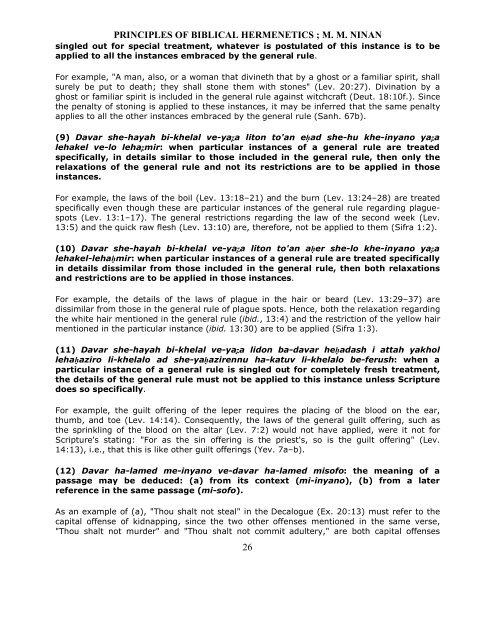Biblical Hermeneutics
You also want an ePaper? Increase the reach of your titles
YUMPU automatically turns print PDFs into web optimized ePapers that Google loves.
PRINCIPLES OF BIBLICAL HERMENETICS ; M. M. NINAN<br />
singled out for special treatment, whatever is postulated of this instance is to be<br />
applied to all the instances embraced by the general rule.<br />
For example, "A man, also, or a woman that divineth that by a ghost or a familiar spirit, shall<br />
surely be put to death; they shall stone them with stones" (Lev. 20:27). Divination by a<br />
ghost or familiar spirit is included in the general rule against witchcraft (Deut. 18:10f.). Since<br />
the penalty of stoning is applied to these instances, it may be inferred that the same penalty<br />
applies to all the other instances embraced by the general rule (Sanh. 67b).<br />
(9) Davar she-hayah bi-khelal ve-yaẓa liton to'an eḥad she-hu khe-inyano yaẓa<br />
lehakel ve-lo lehaẓmir: when particular instances of a general rule are treated<br />
specifically, in details similar to those included in the general rule, then only the<br />
relaxations of the general rule and not its restrictions are to be applied in those<br />
instances.<br />
For example, the laws of the boil (Lev. 13:18–21) and the burn (Lev. 13:24–28) are treated<br />
specifically even though these are particular instances of the general rule regarding plaguespots<br />
(Lev. 13:1–17). The general restrictions regarding the law of the second week (Lev.<br />
13:5) and the quick raw flesh (Lev. 13:10) are, therefore, not be applied to them (Sifra 1:2).<br />
(10) Davar she-hayah bi-khelal ve-yaẓa liton to'an aḥer she-lo khe-inyano yaẓa<br />
lehakel-lehaḥmir: when particular instances of a general rule are treated specifically<br />
in details dissimilar from those included in the general rule, then both relaxations<br />
and restrictions are to be applied in those instances.<br />
For example, the details of the laws of plague in the hair or beard (Lev. 13:29–37) are<br />
dissimilar from those in the general rule of plague spots. Hence, both the relaxation regarding<br />
the white hair mentioned in the general rule (ibid., 13:4) and the restriction of the yellow hair<br />
mentioned in the particular instance (ibid. 13:30) are to be applied (Sifra 1:3).<br />
(11) Davar she-hayah bi-khelal ve-yaẓa lidon ba-davar heḥadash i attah yakhol<br />
lehaḥaziro li-khelalo ad she-yaḥazirennu ha-katuv li-khelalo be-ferush: when a<br />
particular instance of a general rule is singled out for completely fresh treatment,<br />
the details of the general rule must not be applied to this instance unless Scripture<br />
does so specifically.<br />
For example, the guilt offering of the leper requires the placing of the blood on the ear,<br />
thumb, and toe (Lev. 14:14). Consequently, the laws of the general guilt offering, such as<br />
the sprinkling of the blood on the altar (Lev. 7:2) would not have applied, were it not for<br />
Scripture's stating: "For as the sin offering is the priest's, so is the guilt offering" (Lev.<br />
14:13), i.e., that this is like other guilt offerings (Yev. 7a–b).<br />
(12) Davar ha-lamed me-inyano ve-davar ha-lamed misofo: the meaning of a<br />
passage may be deduced: (a) from its context (mi-inyano), (b) from a later<br />
reference in the same passage (mi-sofo).<br />
As an example of (a), "Thou shalt not steal" in the Decalogue (Ex. 20:13) must refer to the<br />
capital offense of kidnapping, since the two other offenses mentioned in the same verse,<br />
"Thou shalt not murder" and "Thou shalt not commit adultery," are both capital offenses<br />
26


















